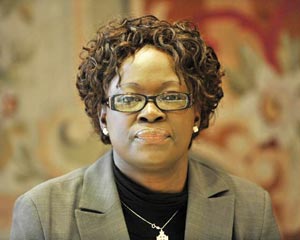
POLICE last week charged former Zimbabwe Peace Project (ZPP) boss Jestina Mukoko with running an unregistered organisation, but analysts say this illustrated just how much the state was turning the screws on civil society.
BY OUR STAFF
Mukoko, a former ZBC news anchor, has had several run-ins with the police over the past five years and many think this is because of her role in documenting political violence and human rights abuses.
In 2008, she was arrested on charges of recruiting militia for the MDC-T. After months in detention and being later given stringent bail conditions, the Supreme Court ordered a permanent stay of execution.
After the failure to prosecute, it seems the state has picked up from where it left off.
Arnold Tsunga, the director of the Africa Regional Programme of the International Commission of Jurists (ICJ), said Mukoko had done a sterling job documenting rights violations and silencing her organisation had become imperative for those scared of democratic processes.
“Her harassment has to be seen as an indicator that our elections are unlikely to be free from violence and other forms of manipulation,” he said.
“Jestina’s ZPP has done a good job in monitoring politically motivated violence in rural areas ahead of elections. Silencing her organisation ahead of elections becomes a top priority for forces that are scared of the democratic process.”
- Chamisa under fire over US$120K donation
- Mavhunga puts DeMbare into Chibuku quarterfinals
- Pension funds bet on Cabora Bassa oilfields
- Councils defy govt fire tender directive
Keep Reading
Civil society organisations (CSOs), feeling the heat of the police’s clampdown on their activities, said they condemned the sustained and escalating assault on non-governmental organisations involved in civic education, human rights monitoring, public outreach and service provision by the State.
“These flagrant, intimidatory and repressive attacks on civil society organisations and their leaders culminated in the charging of Jestina Mukoko with contravening the Private Voluntary Organisations Act, the Broadcasting Services Act and the Customs and Excise Act,” they said in a statement issued on Friday.
“It appears to us that the persecution of Jestina, who is not at any time a fugitive from justice, is a direct victimisation of an individual, who has been a victim of abduction by State security agents. State actions against Jestina were condemned by the Supreme Court and her prosecution quashed.”
The CSOs accused the police of intensive harassment and obstruction of their work “through intimidation, raids, issuance of vague and generalised search warrants, arrests, persecution and prosecution”. “Such harassment is meant to discredit civil society as unpatriotic and devoid of national interest,” they noted.
“The relentless assault on CSOs and accusing them of several unfounded misdemeanors is to suggest to the public the existence of a wide-ranging conspiracy targeting the stability of the country and to paint civil society organisations as a danger to State security.” Police last month vowed to crack down on non-governmental organisations saying some posed a serious security threat.
But it is the renewed attack on Mukoko that is likely to raise eyebrows, as it raises the spectre of the violent 2008 crackdown on human rights organisations.
To add insult to injury, the Zimbabwe electoral commission (ZEC) says organisations under police investigations would not be accredited for next weekend’s referendum.
Observers now question whether the raids on the NGOs were not an elaborate ruse by authorities to ensure that these organisations were not permitted to monitor the elections.










